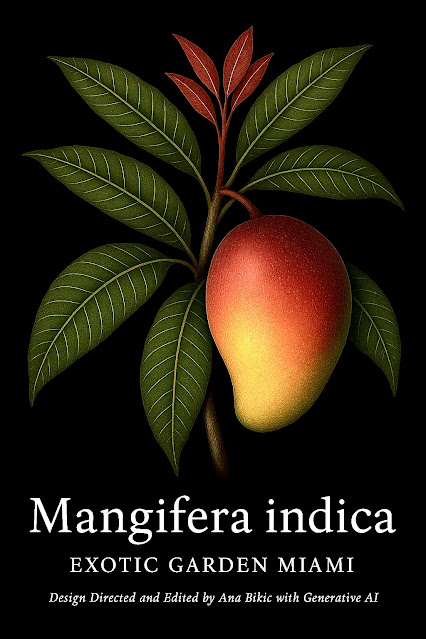 |
| Mango Tree Mangifera Indica Care - Exotic Gardens Tropical South Florida |
Check the Complete List of Plants, Trees, Ornamental and Medicinal Plants
Mangifera indica – Mango Tree
Care | Exotic Gardens | Tropical Fruit Tree | South Florida | Garden Miami
Place of Origin:
Native to South Asia, particularly India and Myanmar. Cultivated for over 4,000 years.
Growing Zone:
USDA Zones 9b–11. Thrives in South Florida’s subtropical climate.
Scientific Name:
Mangifera indica
Common Name:
Mango
Soil:
Prefers well-drained sandy or loamy soils rich in organic matter. Avoid heavy clay. Slightly acidic to neutral pH (5.5–7.5).
Light:
Full sun for best fruit production—at least 8 hours of direct sunlight per day.
Care (including pots):
Can be grown in large containers when young. Requires pruning to manage size. Feed during active growing season with a balanced fertilizer. Mulch well and protect from cold when young.
Pests / Insecticidal Properties:
Pests include mango scale, fruit flies, mealybugs, and anthracnose. Organic neem oil and copper fungicides are often used. No known insecticidal properties from the plant itself.
Watering & pH:
Water deeply during dry periods. Reduce watering during winter. Avoid overwatering. Ideal pH is between 5.5 and 7.5.
Toxicity:
Not toxic to humans. The skin, bark, and sap may cause dermatitis in sensitive individuals (related to poison ivy). Non-toxic to most pets.
Cultural Uses or Stories:
Revered in Hindu and Buddhist cultures as a sacred tree symbolizing love, prosperity, and immortality. Mango leaves are used in Indian weddings and festivals. Its history includes being a gift in ancient royal courts.
Medicinal Properties:
-
Fruit: Rich in beta-carotene, Vitamin C, and antioxidants.
-
Leaves: Used in Ayurvedic medicine for diabetes, wound healing, and inflammation.
-
Bark and Seeds: Antibacterial, astringent, and used for treating diarrhea, gum infections, and respiratory issues.
Vitamins & Nutritional Profile:
High in Vitamin A, C, E, and B6. Contains potassium, fiber, copper, and polyphenols like mangiferin, a potent antioxidant.
Lab Studies & Findings:
-
Mangiferin shows anti-inflammatory, anti-cancer, and neuroprotective activity.
-
Studies support mango’s role in blood sugar regulation, gut health, and immune function.
-
Polyphenols and carotenoids aid in skin rejuvenation and oxidative stress reduction.
Other Uses:
-
Wood: Used in furniture and construction.
-
Cosmetics: Mango butter used in skincare.
-
Culinary: Pickles, chutneys, dried snacks, and beverages.
-
Compost: Leaves and fruit peels enrich soil.
Historical Relevance:
Mango cultivation dates back to 2000 BCE. Introduced to the Americas by Portuguese traders in the 16th century. In the Caribbean and Latin America, mangoes are deeply integrated into food culture and folklore.
Mango Tree, Mangifera Indica, Tropical Fruit, South Florida Garden, Exotic Tree, Medicinal Uses, Vitamin C, Antioxidant, Ayurvedic Herb, Growing Mango, Fruiting Tree, Garden Miami, Mangiferin
Mangifera Indica Mango Tree Care For Exotic Tropical Gardens In Miami, Medicinal Uses Of Mango Leaves In Ayurvedic Healing, Mango Rich In Vitamins And Antioxidants, How To Grow Mango Tree In South Florida Containers, Mango Butter Uses In Skincare And Cosmetics, Historical And Cultural Significance Of Mango In Ancient India, Lab Studies On Mangiferin And Anti-inflammatory Effects, Organic Mango Farming For Home Gardens In South Florida

Comments
Post a Comment